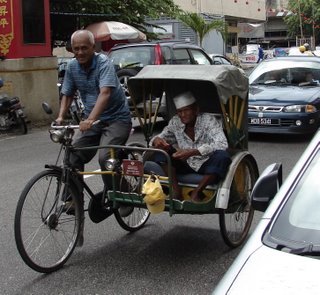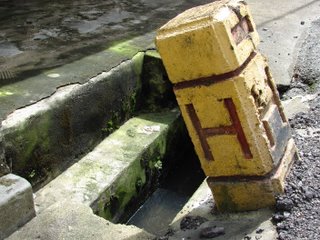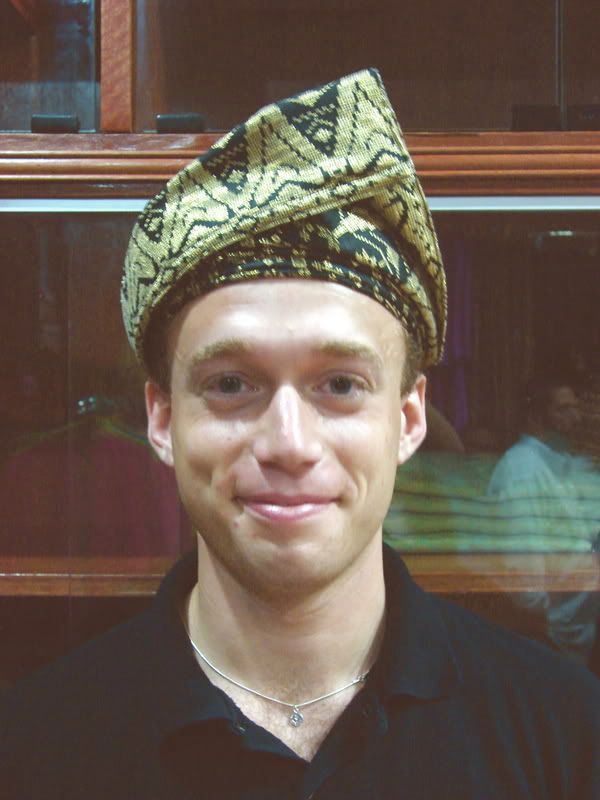
Six days ago, I flew into a small town on the eastern coast of peninsular Malaysia called Kuala Terengganu. While the Malaysian capital, Kuala Lumpur, was a surreal blend of fashion, shopping malls, modernism, and urban life, Kuala Terengganu is, in fact, not. The city is split in half by a shallow and murky river that pours into the South China Sea. The monsoon rains have done a wonderful job of keeping the riverbanks high, but wherever storm drains empty into the river, plastic bags and bottles bob into the river, reminding me that I’m now in a place that is in a struggle between development, responsibility, and purity. Not only in an industrial sense, either. Many Malaysians desire to

be considered one of the developed gems of Southeast Asia, and in fact have a series of aggressive government programs to be considered a developed, rather than a developing, country according to specific criteria set by the United Nations. Those programs include developing a sustainable healthcare system, attracting foreign investment, and most relevant to me, improving English proficiency of the entire population. According to what I’ve been told by state officials, many Malaysians want to become major players on the world economic stage and the best way to communicate in that arena is through English; after all, the U.S. buys over half of Malaysia’s exports.

Kuala Terengganu shows this strain despite itself. Old and decrepit buildings stand right next to brand new cars, businesses, and parks. There are at least five different construction sites within a mile of my hotel to prepare for a Malaysian version of the Olympics next year. Here, there are beautiful museums flanked by lush tropical greenery as well as open sewers. The main industries around here are fishing and petroleum. All day, fishing boats can be seen slowly going up and down the river and their catch is displayed, fresh and wriggling, at the open air market not too far from my hotel. This market is exactly what I pictured Aladdin running around in when he was young. Rows and rows of spices, fabric, clothing, local delicacies, and fresh fish fill the tents as the attendants patiently await customers.

There is less city hustle and bustle than in the national capital, but people still crowd by the piles of food and cloth. This place seems to be a local community center, as children play in between stalls and small groups of friends roam around together, talking and laughing. And even though goods are bought bartered and sold here in the same way they have for centuries, almost everyone has a cell phone and a motorbike. Women with only their feet, hands, and faces visible sweat in the hot equatorial sun and chat away on their phones, sometimes while riding their scooter!

The people here, on the other hand, have been warm, friendly, patient, and extremely generous. Our hotel feeds us excellent local food five times a day, and every tour or museum visit is always accompanied by a catered lunch with some related officials or directors who are extremely polite and welcoming. I feel like I’m being treated like royalty and I can’t wait to start returning some of that kindness through my classroom. I want to start teaching, but I’m afraid that I would do more harm than good until I’m taught a little more about the language, culture, and teaching methods.









 Six days ago, I flew into a small town on the eastern coast of peninsular Malaysia called Kuala Terengganu. While the Malaysian capital, Kuala Lumpur, was a surreal blend of fashion, shopping malls, modernism, and urban life, Kuala Terengganu is, in fact, not. The city is split in half by a shallow and murky river that pours into the South China Sea. The monsoon rains have done a wonderful job of keeping the riverbanks high, but wherever storm drains empty into the river, plastic bags and bottles bob into the river, reminding me that I’m now in a place that is in a struggle between development, responsibility, and purity. Not only in an industrial sense, either. Many Malaysians desire to
Six days ago, I flew into a small town on the eastern coast of peninsular Malaysia called Kuala Terengganu. While the Malaysian capital, Kuala Lumpur, was a surreal blend of fashion, shopping malls, modernism, and urban life, Kuala Terengganu is, in fact, not. The city is split in half by a shallow and murky river that pours into the South China Sea. The monsoon rains have done a wonderful job of keeping the riverbanks high, but wherever storm drains empty into the river, plastic bags and bottles bob into the river, reminding me that I’m now in a place that is in a struggle between development, responsibility, and purity. Not only in an industrial sense, either. Many Malaysians desire to  be considered one of the developed gems of Southeast Asia, and in fact have a series of aggressive government programs to be considered a developed, rather than a developing, country according to specific criteria set by the United Nations. Those programs include developing a sustainable healthcare system, attracting foreign investment, and most relevant to me, improving English proficiency of the entire population. According to what I’ve been told by state officials, many Malaysians want to become major players on the world economic stage and the best way to communicate in that arena is through English; after all, the U.S. buys over half of Malaysia’s exports.
be considered one of the developed gems of Southeast Asia, and in fact have a series of aggressive government programs to be considered a developed, rather than a developing, country according to specific criteria set by the United Nations. Those programs include developing a sustainable healthcare system, attracting foreign investment, and most relevant to me, improving English proficiency of the entire population. According to what I’ve been told by state officials, many Malaysians want to become major players on the world economic stage and the best way to communicate in that arena is through English; after all, the U.S. buys over half of Malaysia’s exports.  Kuala Terengganu shows this strain despite itself. Old and decrepit buildings stand right next to brand new cars, businesses, and parks. There are at least five different construction sites within a mile of my hotel to prepare for a Malaysian version of the Olympics next year. Here, there are beautiful museums flanked by lush tropical greenery as well as open sewers. The main industries around here are fishing and petroleum. All day, fishing boats can be seen slowly going up and down the river and their catch is displayed, fresh and wriggling, at the open air market not too far from my hotel. This market is exactly what I pictured Aladdin running around in when he was young. Rows and rows of spices, fabric, clothing, local delicacies, and fresh fish fill the tents as the attendants patiently await customers.
Kuala Terengganu shows this strain despite itself. Old and decrepit buildings stand right next to brand new cars, businesses, and parks. There are at least five different construction sites within a mile of my hotel to prepare for a Malaysian version of the Olympics next year. Here, there are beautiful museums flanked by lush tropical greenery as well as open sewers. The main industries around here are fishing and petroleum. All day, fishing boats can be seen slowly going up and down the river and their catch is displayed, fresh and wriggling, at the open air market not too far from my hotel. This market is exactly what I pictured Aladdin running around in when he was young. Rows and rows of spices, fabric, clothing, local delicacies, and fresh fish fill the tents as the attendants patiently await customers.  There is less city hustle and bustle than in the national capital, but people still crowd by the piles of food and cloth. This place seems to be a local community center, as children play in between stalls and small groups of friends roam around together, talking and laughing. And even though goods are bought bartered and sold here in the same way they have for centuries, almost everyone has a cell phone and a motorbike. Women with only their feet, hands, and faces visible sweat in the hot equatorial sun and chat away on their phones, sometimes while riding their scooter!
There is less city hustle and bustle than in the national capital, but people still crowd by the piles of food and cloth. This place seems to be a local community center, as children play in between stalls and small groups of friends roam around together, talking and laughing. And even though goods are bought bartered and sold here in the same way they have for centuries, almost everyone has a cell phone and a motorbike. Women with only their feet, hands, and faces visible sweat in the hot equatorial sun and chat away on their phones, sometimes while riding their scooter! The people here, on the other hand, have been warm, friendly, patient, and extremely generous. Our hotel feeds us excellent local food five times a day, and every tour or museum visit is always accompanied by a catered lunch with some related officials or directors who are extremely polite and welcoming. I feel like I’m being treated like royalty and I can’t wait to start returning some of that kindness through my classroom. I want to start teaching, but I’m afraid that I would do more harm than good until I’m taught a little more about the language, culture, and teaching methods.
The people here, on the other hand, have been warm, friendly, patient, and extremely generous. Our hotel feeds us excellent local food five times a day, and every tour or museum visit is always accompanied by a catered lunch with some related officials or directors who are extremely polite and welcoming. I feel like I’m being treated like royalty and I can’t wait to start returning some of that kindness through my classroom. I want to start teaching, but I’m afraid that I would do more harm than good until I’m taught a little more about the language, culture, and teaching methods. 










2 Comments:
your photographs are beautiful and i enjoyed reading about your experiences!!
straight to the heart. :) you do take every second to value what you've experience. you're combining both thought and experience at the same time which i think it's really interestin to read. i do enjoy reading it and you've got great pics.
Post a Comment
<< Home